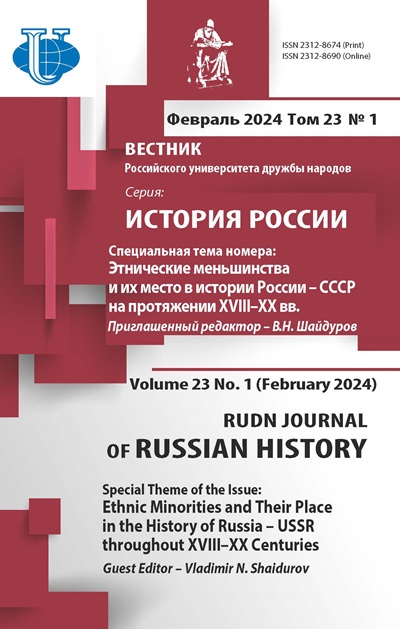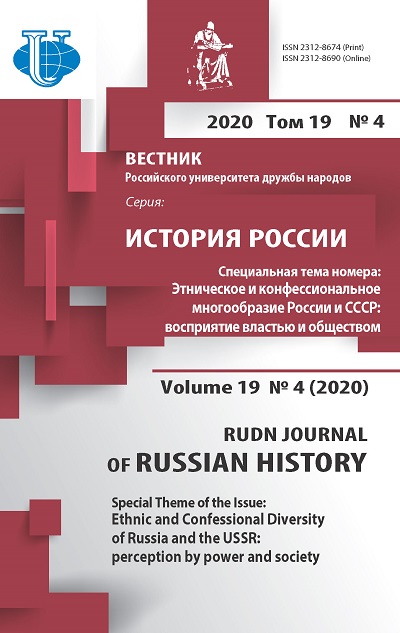The Visit of the Vice-Chief of the Japanese Army’s General Staff Kawakami Sōroku to Priamur Military District (1897)
- Authors: Avilov R.S.1
-
Affiliations:
- Institute of History, Archaeology and Ethnography of the Peoples of the Far East FEB RAS
- Issue: Vol 19, No 4 (2020): Ethnic and confessional diversity of Russia and the USSR: perception by power and society
- Pages: 934-951
- Section: ARTICLES
- URL: https://journals.rudn.ru/russian-history/article/view/25088
- DOI: https://doi.org/10.22363/2312-8674-2020-19-4-934-951
Cite item
Full text / tables, figures
Abstract
In 1897, the Vice-Chief of the Japanese Army’s General Staff, Lieutenant General Kawakami Sōroku, visited the Russian Far East. Based on a large body of hitherto unstudied documents from the Russian State Military Historical Archive, this article analyzes the composition of the Japanese delegation as well as that of the Russian administration that hosted the Japanese guests. Among the hosts were Vladimir A. Oranovskiy and Vladimir K. Samoilov, who would later became famous as military orientalists and as the founders of Russia’s military intelligence in the region. The highest official who met the Japanese mission was the Temporary Chief of Troops of Priamur Military District, Lieutenant-General Nikolay I. Grodekov, widely known at that time as a military man, administrator, and scholar. The article discusses in detail the preparation of the visit by the Russian regional government, including the planned itinerary, preparations for the diet of the guests as well as their accommodation and transport issues. Equally analyzed are the organizational difficulties that occurred during the visit. The main interests of the Japanese delegation were the current condition of the Russian forces in a region, the development of military transport and port infrastructure, the level of regional colonization, issues of military training and combat readiness, new artillery systems, small arms, and winter outfit. The Japanese General Staff was particular interested in the defense condition of Vladivostok Fortress, with one officer in the Japanese delegation being assigned to investigate this particular question. An interesting feature is the cooperation between the General Staff and semi-commercial Japanese organizations for the collection of data about the current state of the Russian Far East. The article also studies the conclusions drawn by the Russian military attaché in Japan, which appear to be inaccurate and questionable. While this visit did not arouse much interest in the central administration of the Russian War Ministry, it was of utmost importance to Japan, which already at that time regarded the Russian Empire as a potential threat and enemy.
About the authors
Roman S. Avilov
Institute of History, Archaeology and Ethnography of the Peoples of the Far East FEB RAS
Author for correspondence.
Email: avilov-1987@mail.ru
Kandidat Istoricheskikh Nauk [PhD in history], Senior Researcher, Department of the History of the Russian Far East
89, Pushkinskaya St., Vladivostok, 690001, RussiaReferences
- Avilov, R.S. “The problem of a military defense planning of the Russian Far East in 1896–1900. After the Sino-Japanese War of 1894–1895.” Tomsk State University Journal, no. 434 (2018): 94–107 (in Russian).
- Avilov, R.S. “The problem of a military defense planning of the Russian Far East in 1896–1900. The eve of the Chinese campaign of 1900–1901.” Tomsk State University Journal, no. 441 (2019): 128–141 (in Russian).
- Ayrapetov, O.R. Istoriya vneshney politiki Rossiiskoy imperii. 1801–1914 gg. Vol. 4. Vneshnyaya politika imperatora Nikolaya II. 1894–1914. Moscow: Kuchkovo pole Publ., 2018 (in Russian).
- Alekseev, M. Voennaya razvedka Rossii ot Ryurika do Nikolaya II. Book 1. Moscow: Izdatel'skii dom «Russkaya razvedka», IIA «Evrazya+» Publ., 1998 (in Russian).
- Budberg, A.P. Siberian memoirs. Vladivostok: SSAR–PRD RGS, 2017 (in Russian).
- Dobychina, E.V. Vneshnyaya razvedka Rossii na Dal'nem Vostoke 1895–1904 gg. Moscow: Institute of Russian History Publ., 2003 (in Russian).
- Kutakov, L.N. Rossiya i Yaponiya. Moscow: Nauka Publ., 1988 (in Russian).
- Lukoyanov, I.V. «Ne otstat' ot derzhav…» Rossiya na Dal'nem Vostoke v kontse XIX – nachale ХХ vv. St. Petersburg: Nestor-Istoriya Publ., 2008 (in Russian).
- Morgun, Z.F. Yaponskaya mozaika Vladivostoka: 1860–1937 (Kartina zhizni Vladivostoka na primere yaponskoi diaspory). Vladivostok: PKGM im. V.K. Arsen'eva, 2014 (in Russian).
- Pavlov, D.B. Russko-yaponskaya voina 1904–1905 gg.: Sekretnye operatsii na sushe i na more. Moscow: Materik Publ., 2004 (in Russian).
- Polutov, A.V. “Intelligence activities of the Commercial agency of Japan in Vladivostok before the Russian-Japanese war.” Vestnik of the Far East Branch of the Russian Academy of Sciences, no. 5 (2008): 100–106 (in Russian).
- Polutov, A.V. Desantnaya operatsiya yaponskoi armii i flota v fevrale 1904 g. v Inchkhone. Vladivostok: Russkiy Ostrov Publ., 2009 (in Russian).
- Polutov, A.V. “The Activity of the Japanese Intelligence in Vladivostok (1875–1902).” Russia and the Pacific, no. 2 (2011): 215–228 (in Russian).
- Rybachenok, I.S. “«Granitsa mezhdu Rossiey i Yaponiey odna – okean». Sekretnaya zapiska knyazya A.M. Volkonskogo.” Istochnik, no. 5 (1995): 5–14 (in Russian).
- Rybachenok, I.S. Zakat velikoy derzhavy. Vneshnyaya politika Rossii na rubezhe XIX–XX vv.: tseli, zadachi, metody. Moscow: ROSSPEN Publ., 2012 (in Russian).
- Sarkisov, K.O. Rossiya i Yaponiya. Sto let otnosheniy (1817–1917). Moscow: OLMA Media Grupp Publ., 2015 (in Russian).
- Sergeev, E.Yu. Voennaya razvedka Rossii v bor'be protiv Yaponii, 1904–1905 gg. Moscow: Tovarishchestvo nauchnykh izdanii KMK Publ., 2010 (in Russian).
- Steinberg, J.W. “Was the Russo-Japanese War World War Zero?” The Russian Review 67, no. 1 (2008): 1–7.
- Wittfogel, K.A. “Russia and the East: A Comparison and Contrast.” Slavic Review 22, no. 4 (1963): 627–643.
















